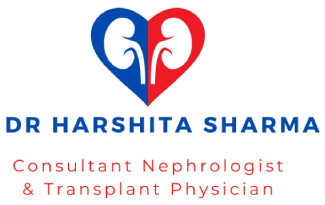Cystic kidney Diseases Treatment in Bhopal
Cystic Kidney Disease

What is Cystic Kidney Disease?
Types of Cystic Kidney Diseases
- Autosomal Dominant Polycystic Kidney Disease (ADPKD)
- Autosomal Recessive Polycystic Kidney Disease (ARPKD)
- Multicystic Dysplastic Kidney (MCDK)
- Simple Renal Cysts
- Medullary Sponge Kidney
Meet Dr. Harshita Sharma – Your PKD Specialist Nephrologist in Bhopal
- MBBS from VMMC & Safdarjung Hospital, New Delhi
- MD in Internal Medicine from the same institute
- Fellowship in Glomerular Diseases (GLOMCON, 2024)
- SCE-Neph (MRCP-UK Certified, 2022)
Treatment Options for Cystic Kidney Disease
1. Blood Pressure Control
Managing high blood pressure is critical in PKD. Dr. Sharma tailors medication and lifestyle changes to each patient.
2. Pain Management
For patients experiencing back or abdominal pain due to cyst enlargement, safe and effective pain relief is provided.
3. Infection Control
Cysts can sometimes become infected. Prompt antibiotic treatment and regular monitoring are key.
4. Preventing Kidney Failure
Through dietary plans, medication, and close follow-up, Dr. Sharma helps delay or avoid kidney failure.
Symptoms of Cystic Kidney Disease
- High blood pressure
- Back or side pain
- Blood in urine
- Frequent urinary tract infections
- Abdominal swelling
- Kidney stones
Diagnosis of Cystic Kidney Disease
- Ultrasound or MRI scans to detect kidney cysts
- Urine analysis for infections or blood presence
- Genetic testing for inherited forms of PKD
- Blood tests to check kidney function
FAQs – Cystic kidney Diseases
Is PKD curable?
No, PKD is a chronic genetic condition. However, with the right care, you can live a full, active life.
When should I see a cystic kidney disease specialist in Bhopal?
If you have a family history of PKD, high blood pressure, or unexplained kidney issues, it’s best to consult early.
How often do I need follow-ups?
Follow-ups vary based on the disease stage, but typically every 3–6 months to track kidney function and adjust treatment.





